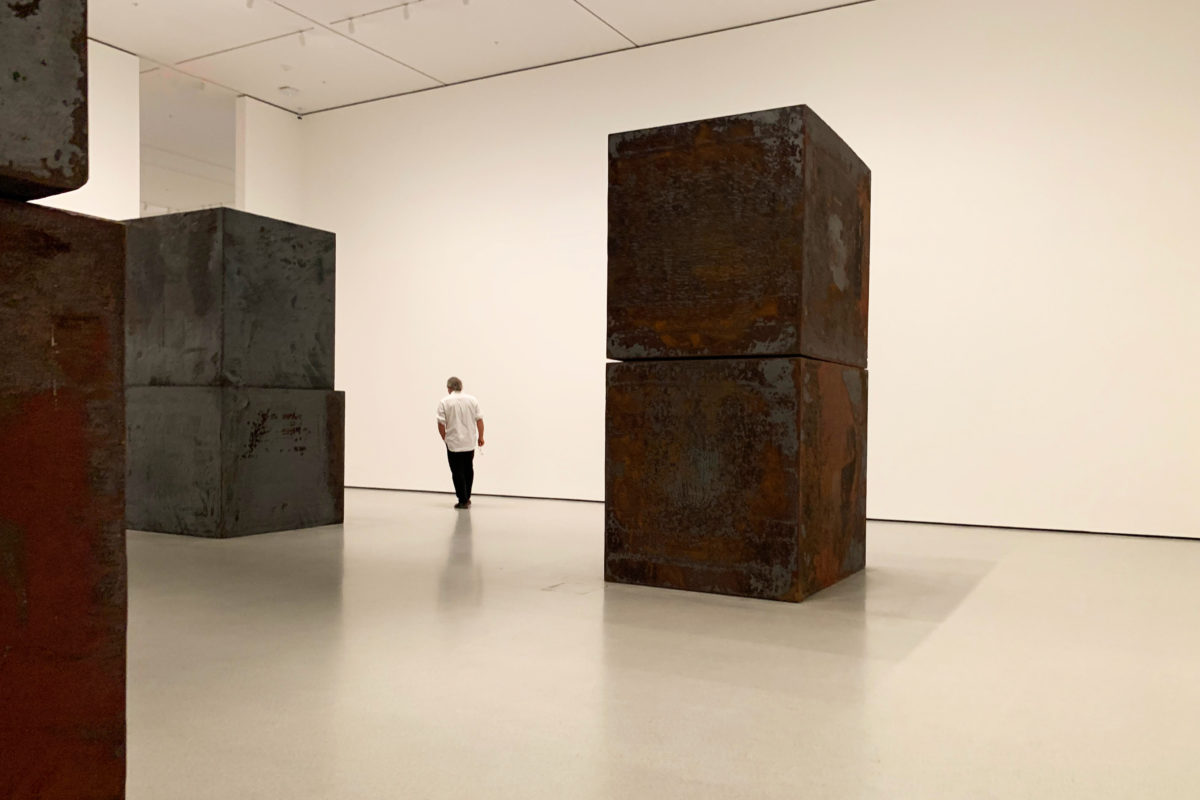There’s a lot to see at the new Museum of Modern Art (MoMA) in New York. We’re sharing what we saw on our first visit after the museum reopened in fall 2019 after a major expansion, one exhibit at a time. After seeing Betye Saar: The Legends of Black Girl’s Window and David Tudor’s Rainforest V (variation 1), we popped in to spend a few minutes with Richard Serra’s monumental sculpture Equal (2015) at the new MoMA New York.
Feeling The Weight of Richard Serra’s Equal at the MoMA
MoMA has had a long relationship with Minimalist sculptor Richard Serra. The museum mounted a major retrospective on his work in 2007, and it owns a number of his major works. So it’s not surprising that part of the grand reveal of the “new” MoMA in October 2019 includes one of Serra’s monumental works.
Join our community
For access to insider ideas and information on the world of luxury, sign up for our Dandelion Chandelier newsletter. And see luxury in a new light.
You can find it on the second floor of the new David Geffen Wing, where it occupies its own space, specially designed to carry its weight.
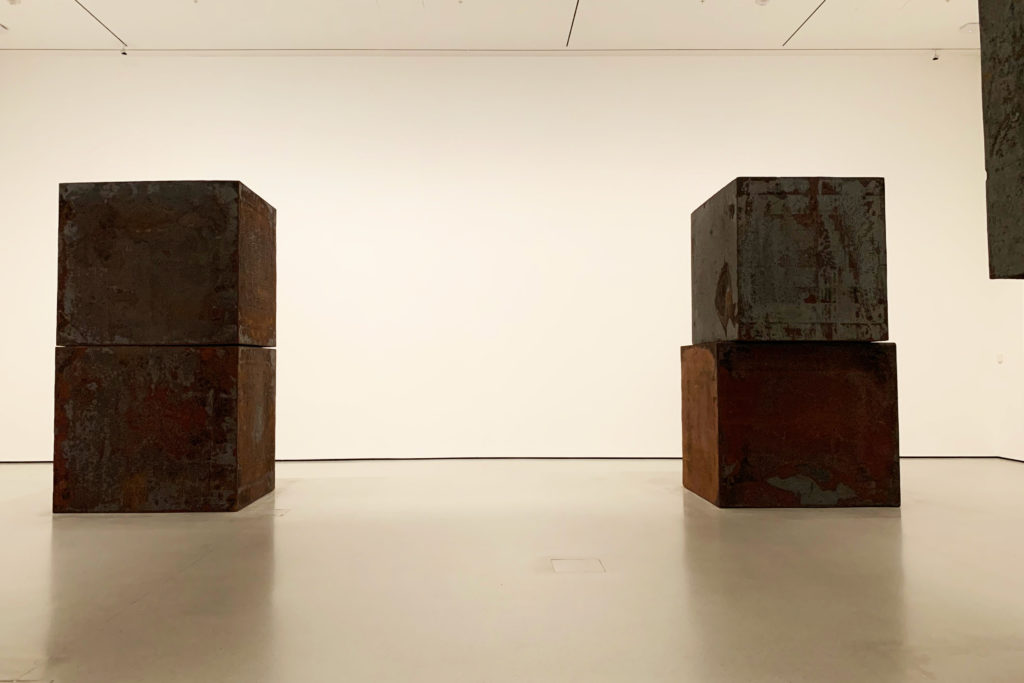
Richard Serra’s sculpture Equal at the Museum of Modern Art (MoMA) in New York City. Photo Credit: Dandelion Chandelier.
Adding to the significance of a visit to Serra’s work this fall is that the 80-year old sculptor, who lives in TriBeCa, saw three exhibitions of his new work open simultaneously just a few weeks earlier at the Gagosian Gallery in Chelsea and on the Upper East Side. It would be hyperbolic to say that Serra is having a Moment. But it is important to note his stature in the pantheon of living sculptors. He’s without question one of the best-known and respected Americans artists of his time.
A visit is not to be taken lightly, in other words. And the idea of weight versus evanescence, and whether anything can (or should) ever be taken lightly, is a prominent theme underlying the way in which we experienced this particular work.
what is Richard Serra’s Equal?
Like all Serra sculptures, Equal is Brobdingnagian in scale. And like most, its color palette is autumnal – rust, dark brown, misty grey and deep charcoal. Like many, it also feels unfinished – “down and dirty” as the artist himself says. There’s no shine or polish – just brute strength.
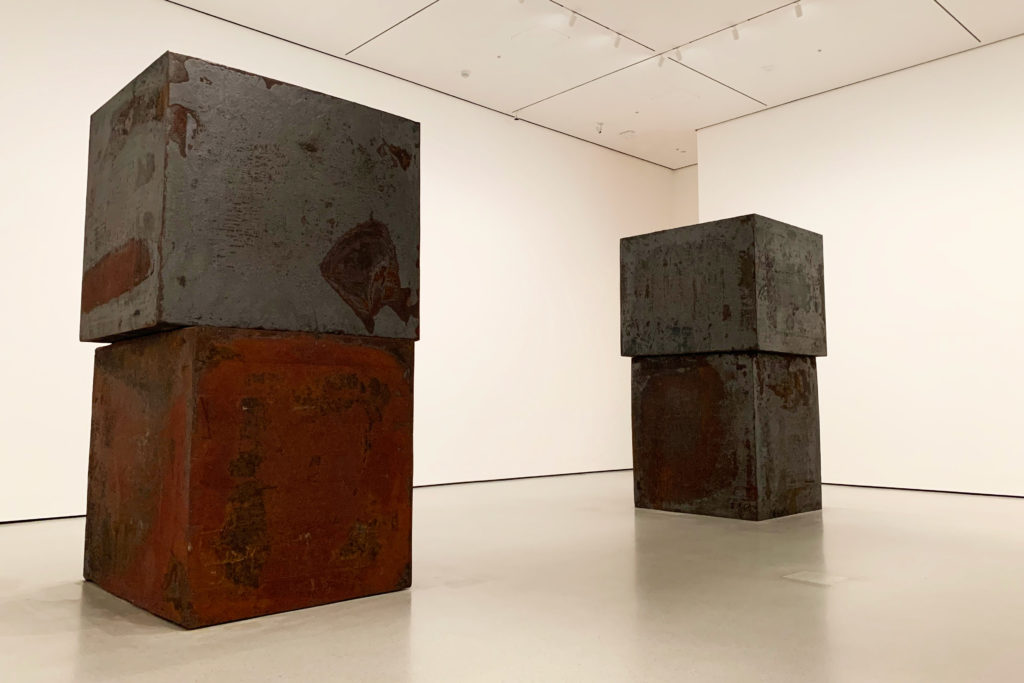
Richard Serra’s sculpture Equal at the Museum of Modern Art (MoMA) in New York City. Photo Credit: Dandelion Chandelier.
Unlike the other ones we’ve seen, though, this sculpture is made of eight blocks of steel in the shape of sharp-edged cubes.
We once got pleasantly lost in the seductive swirl of Serra’s sculpture Sequence while it was on view at the San Francisco Museum of Modern Art. Its circular energy has stayed with us ever since.
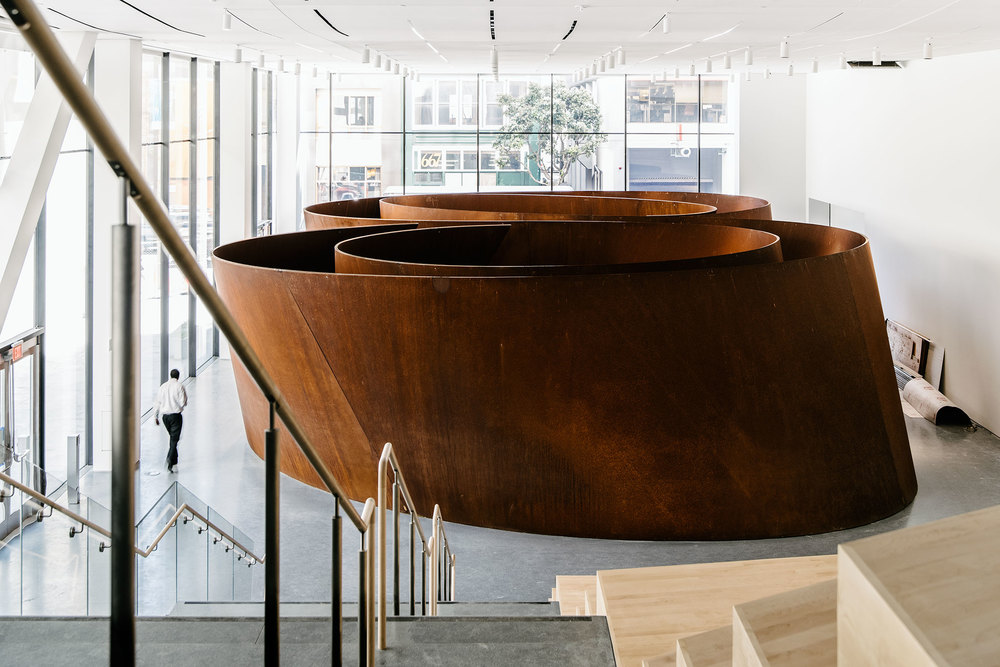
Richard Serra’s sculpture Sequence at the San Francisco Museum of Modern Art (SFMoMA)
Then we saw the sculptor’s Five Plates, Two Poles at the Minneapolis Sculpture Garden at the Walker Center for the Arts. There, the steel elements Serra employs are tall, slim and elegant.
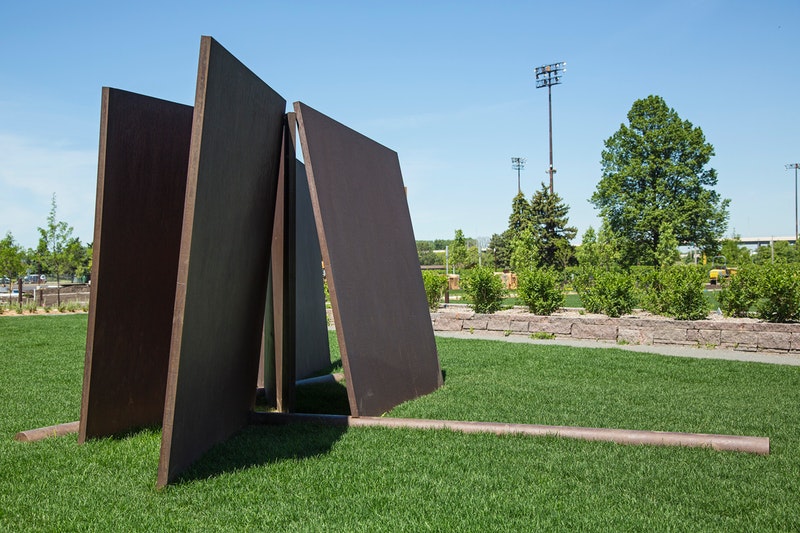
Richard Serra’s Five Plates, Two Poles at the Minneapolis Sculpture Garden.
The feeling in this piece is quite different – quite the opposite, actually.
Displayed in four pairs, with one block precariously placed on top of the other, the stolid steel cubes weigh 40 tons each. (The New York Times notes that together these cubes weigh more than a Boeing 777). Imagine extremely large blocks of ice waiting to be carved into usable pieces. Or sculpted into something beautiful.
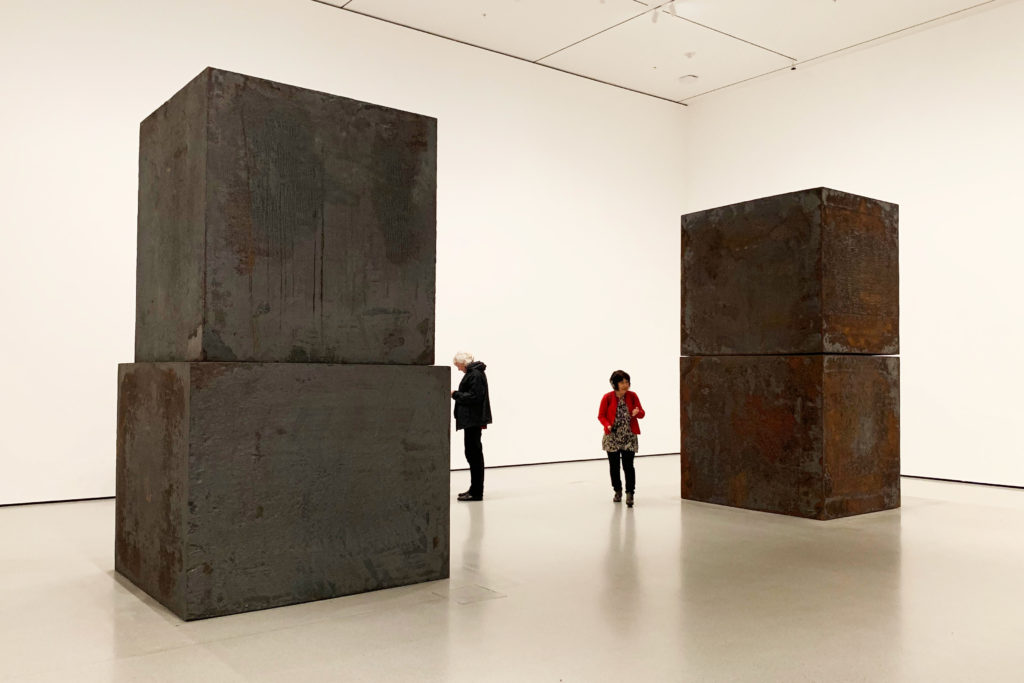
Richard Serra’s sculpture Equal at the Museum of Modern Art (MoMA) in New York City. Photo Credit: Dandelion Chandelier.
While Serra’s sculpture Sequence invites viewers in – literally – it’s puzzling to understand how to approach Equal. Where to start? Where to end? Is it OK to touch?
The MoMA’s curator notes that “Serra studies form . . . as a result, his sculptures produce in us a heightened awareness of our surroundings.”
Unlike Sequence, which could be said to offer a place to hide – a sheltering presence – with Equal everything is exposed. To the elements, to the naked eye, to our judgement or indifference.
For the first couple of minutes, the entire work feels overwhelming. But circle through it a couple of times, and it will start to seem almost . . . mundane.
After all, we New Yorkers live in a city filled with skyscrapers. We’re used to towering structures, and we know how to make our presence felt, no matter how tall the building. Even something so monumental can start to seem par for the course when you spend a few minutes around it.
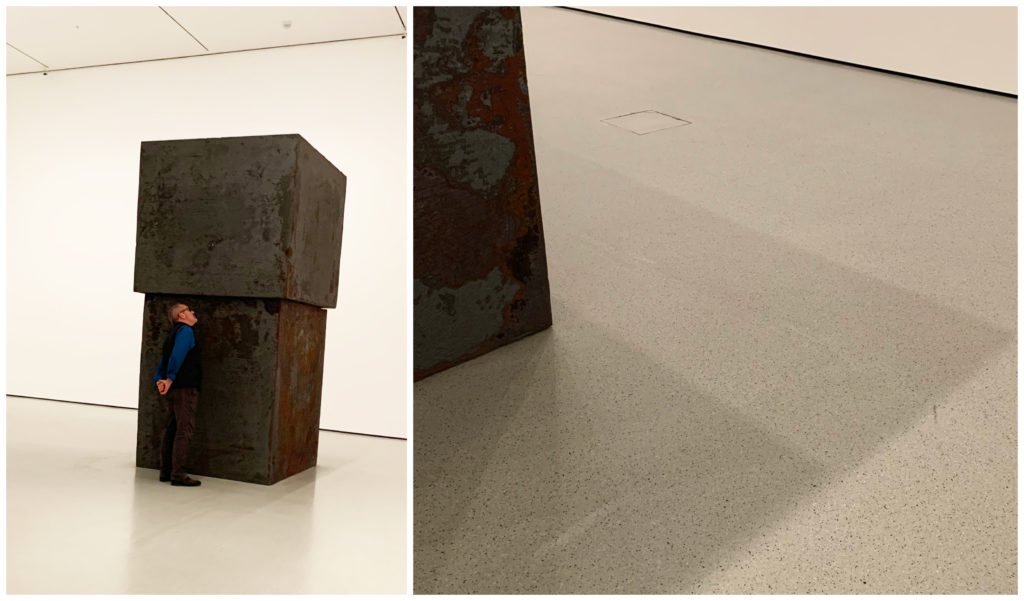
Richard Serra’s sculpture Equal at the Museum of Modern Art (MoMA) in New York City. Photo Credit: Dandelion Chandelier.
In this case, though, instead of beginning to fade into the background, as skyscrapers ultimately do, here the blocks became more totemic with the passage of time. As if they they were the literal remains of something that was once much larger and more significant. The ruins of something great, even. A feeling of mourning, or sorrow starts to settle in. A whiff of shadows and loss.
Is Equal a warning? A reminder that in an era of climate change, global conflict and a loss of common purpose, nothing is actually fixed or certain? Will the foundation hold? That’s still TBD.
The striations in the steel actually look a map of the world, or a swath of desert land. What remains when the infrastructure and the supports that once upheld a society are gone? Does it all revert to barren wasteland and dust, as if it had never been?
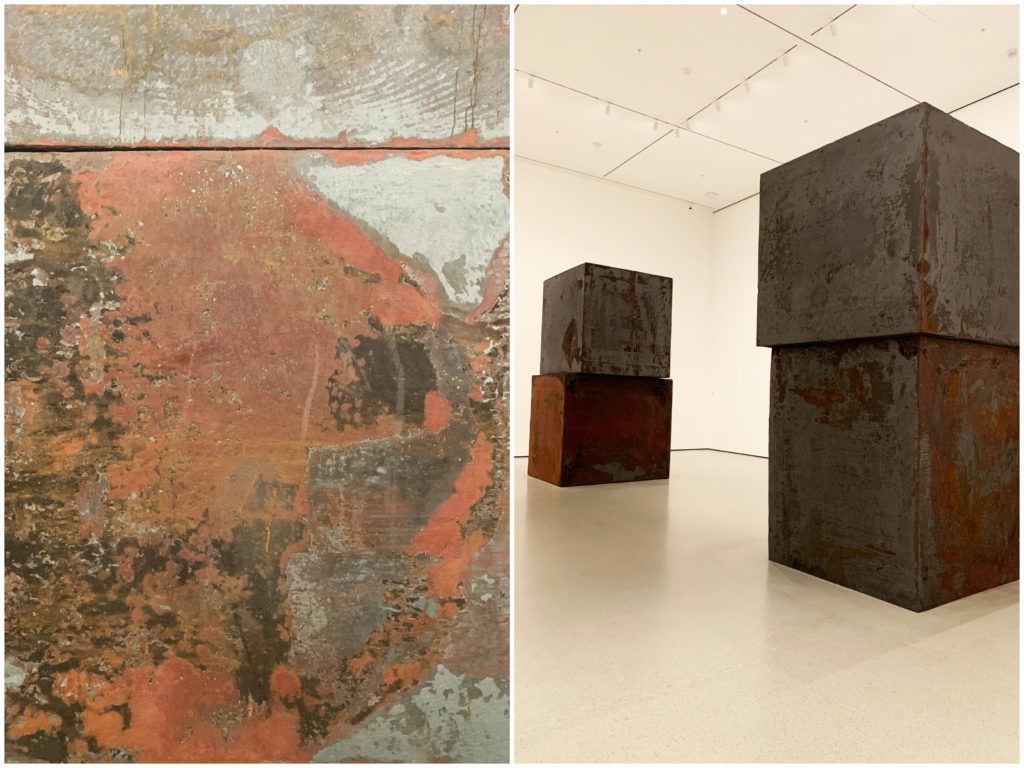
Richard Serra’s sculpture Equal at the Museum of Modern Art (MoMA) in New York City. Photo Credit: Dandelion Chandelier.
This work seems to say, with the utmost gravity: Will the foundation hold? That’s up to you.
Feeling The Weight of Richard Serra’s Equal at the MoMA
Equal is part of the permanent collection at MoMA New York. So you have plenty of time to see it. We hope you will. If you do, let us know what you make of it.
join our community
For access to insider ideas and information on the world of luxury, sign up for our Dandelion Chandelier newsletter here. And see luxury in a new light.
Join our community
For access to insider ideas and information on the world of luxury, sign up for our Dandelion Chandelier newsletter. And see luxury in a new light.

